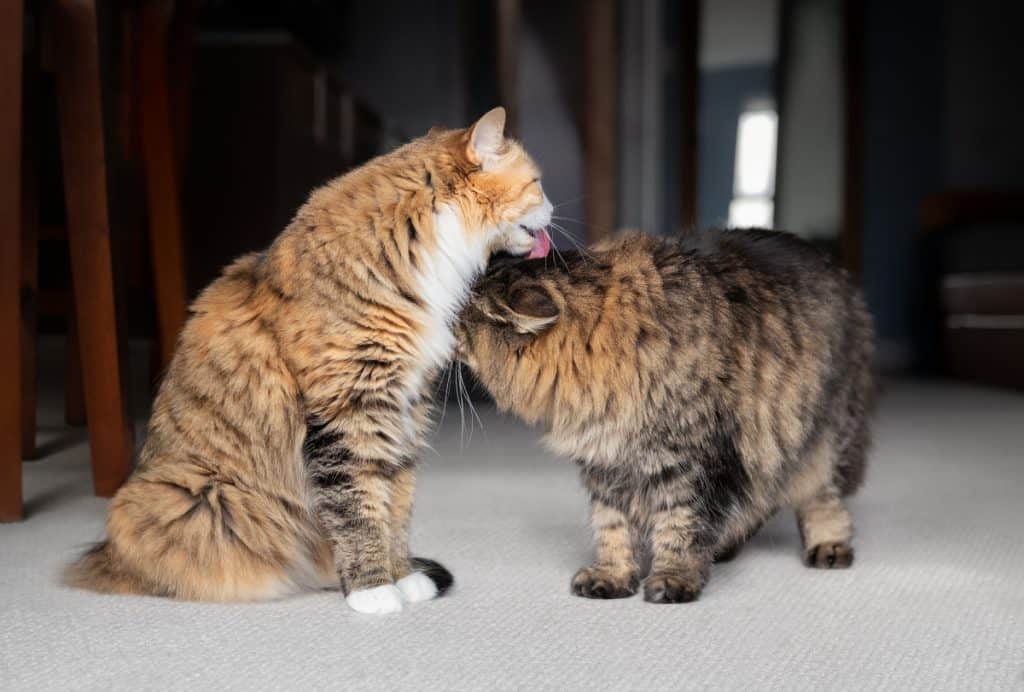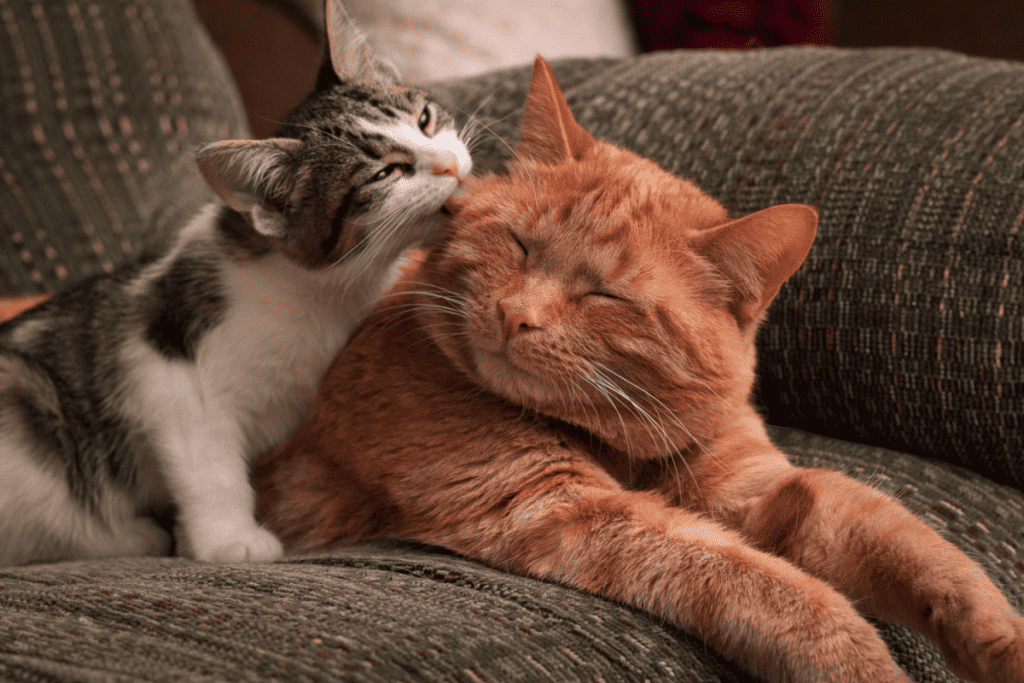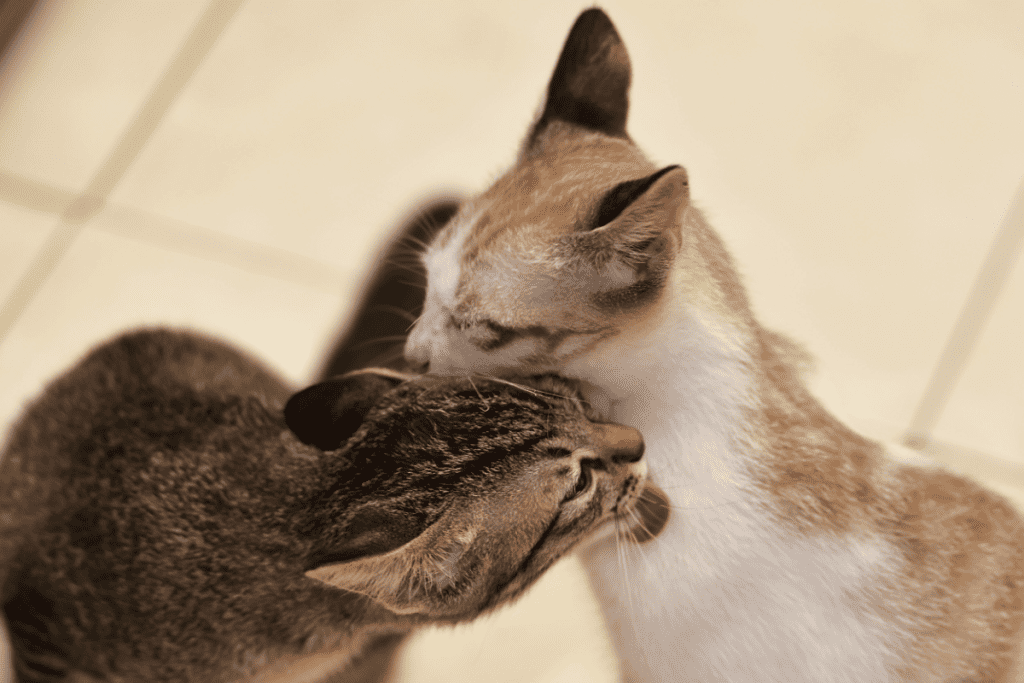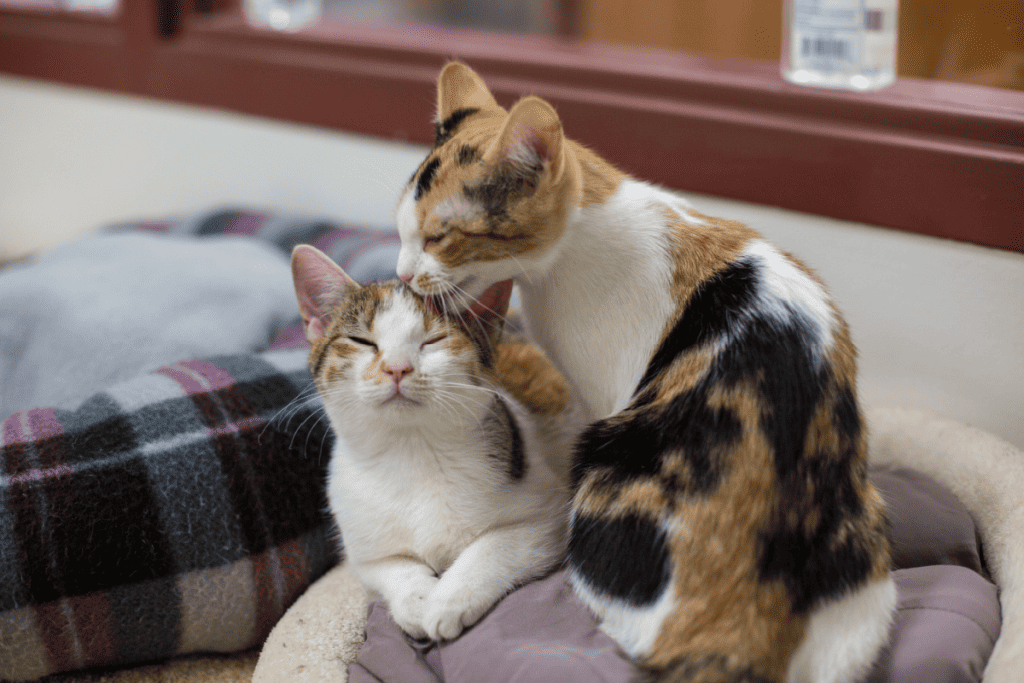Welcome to the intriguing exploration of cat behavior! Today we will explore the nuances of grooming practices among our feline friends.
Many cat owners may have observed a heartwarming behavior called mutual grooming (also called "allogrooming").
However, it's essential to note that not all cats that live together will groom each other, and this is perfectly normal.
If your cat isn't grooming another, it might cause some concern.
To help assuage these concerns, we will dive into the multiple reasons why cats may not groom each other, providing insight into this complex behavior.
Why Some Cats Don't Groom Each Other
Cats, like humans, have a myriad of reasons that influence their behavior.
Cats are as unique and individual as snowflakes, each boasting their own distinct personality and preferences.
When it comes to grooming, factors such as personality differences, relationship dynamics, and breed-specific traits play substantial roles.

Unraveling Cat Personalities: The Solitary Groomers
Cats, much like humans, possess distinctive personalities that govern their behaviors.
A key element contributing to why some cats don't groom each other is rooted in their individual temperaments.
Certain felines have a more solitary nature, cherishing their personal space, and hence prefer to groom themselves.
These independent souls may not partake in mutual grooming, even if they share a living space with other cats.
They often view grooming as a private practice, one to be conducted in solitude and peace.
Their personalities may not align with the sociable characteristics usually associated with mutual grooming.
Interpreting Feline Relationships: The Power of Bonding
Another significant determinant in whether cats groom each other is the quality of their relationship.
Allogrooming, or social grooming, typically requires a certain level of comfort, trust, and bond between the cats.
Cats that have spent substantial periods together, such as littermates or a mother and her kittens, are more likely to engage in these bonding behaviors.
However, cats without such relationships may not feel secure or close enough to engage in grooming each other.
Thus, the bond that prompts allogrooming is crucial, and the lack thereof can explain why certain cats do not partake in this activity.
Diving into Cat Breeds: The Sociability Factor
Lastly, breed-specific characteristics can significantly influence cats' grooming behaviors.
Different breeds have diverse temperaments and behaviors, and these variations can affect their inclination towards mutual grooming.
Some breeds are inherently more sociable and likely to engage in communal activities like grooming than others.
Additionally, kittens, irrespective of their breed, are usually more inclined towards mutual grooming.
This behavior is part of their learning and socialization process, and while it may diminish as they grow older, it's usually more prominent during their formative months.
Therefore, understanding a cat's breed and its associated behavioral traits can provide valuable insight into their grooming habits.

The Role of Age in Cat Grooming Behavior
It's worth paying attention to the fact that age can play a crucial role in a cat's grooming behavior.
Cats, much like humans, exhibit different behavioral tendencies at different stages of their life, and this extends to their grooming practices as well.
Younger cats, especially kittens, are often more inclined towards mutual grooming, also known as allogrooming.
This behavior is not merely about cleanliness; it's a significant part of their learning and socialization process.
During their early life stages, kittens learn important life skills from their mother and siblings, and grooming is one of them.
By observing and engaging in mutual grooming with their siblings or mother, kittens learn how to care for themselves and interact within their social sphere.
Mutual grooming helps kittens forge bonds with their siblings, understand social hierarchy, and establish their place within it.
The early phase of mutual grooming also allows kittens to get familiar with the scents of their littermates, which is a crucial part of recognizing friend from foe in the feline world.
On the other hand, older cats tend to engage less in mutual grooming.
Their grooming habits often become more self-focused, particularly if they're solitary or not part of a bonded pair or group.
This isn't to say that older cats won't participate in mutual grooming at all. It simply means that the frequency might diminish, and the focus may shift more towards self-grooming.

The Impact of Human Interaction on Cat Grooming Behavior
When discussing the factors influencing cat grooming behavior, it's crucial to consider the role of human interaction.
As a cat owner, the time and attention you dedicate to your cat can significantly shape their grooming habits, including the frequency and nature of mutual grooming.
When you spend quality time grooming your cat, not only are you helping maintain their coat's cleanliness and reducing the likelihood of skin issues, but you're also reinforcing your bond with them.
Cats regard grooming as a comforting and social activity. When they receive this care and attention from you, it helps instill a sense of security and trust.
Furthermore, cats that receive ample grooming from their human caregivers might find themselves less inclined to engage in mutual grooming with other cats.
This can especially be the case in single-cat households where the cat perceives the owner as their primary social partner.
However, it's worth noting that while grooming your cat can contribute positively to their hygiene and your bond with them, it doesn't entirely replace the benefits of mutual grooming between cats.
Overall, human interaction plays a significant role in shaping a cat's grooming behavior.

Ensuring Feline Happiness: The Ultimate Goal
As we navigate through the fascinating world of cat grooming behaviors, it's crucial to remember one fundamental principle: as long as your cats are happy and healthy, there's no need to worry if they don't groom each other.
Their well-being doesn't necessarily depend on mutual grooming.
The intricacies of cat behavior are vast, and mutual grooming is just one of the many aspects that we, as cat owners and lovers, get to observe and learn from.
So, if your cat isn't grooming the other, embrace it as another facet of their unique personality.
Observe, learn, and enjoy the companionship of your feline friends, appreciating the subtle dynamics at play, reflecting on the silent language that speaks volumes about their unique personalities and relationships.
Your cats' behavior is a window into their world, offering fascinating insights into their lives.
For more on grooming:
4 Things Reddit Users Do to Groom Their Cats [And One They Don’t]
Some elements on this page may have been created by our team using advanced AI to provide you with top-notch cat inspired ideas. Read more about our AI Content Policy.
